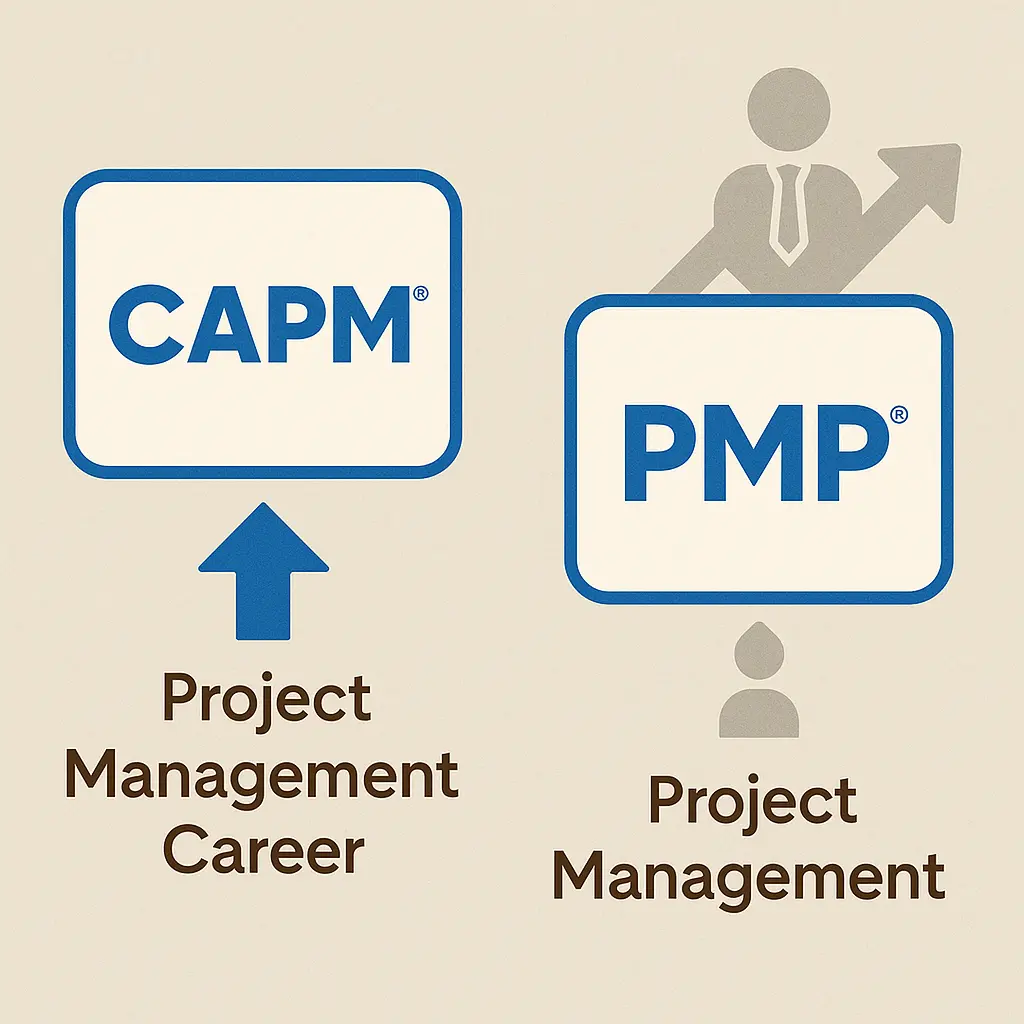What You Can Do with a CAPM® Certification vs a PMP® Certification
By: Ryan Malaluan, CAPM®; Editor: Geram Lompon; Reviewed by: Alvin Villanueva, PMP®, PMI-ACP®
Thinking about moving up in your
The PMI® gives out these certifications to prove your skills. Both are respected, but they cater to different levels of experience and goals.
It’s essential to understand the distinctions between the CAPM® and the PMP®. This article will help you understand both, allowing you to choose the best path for your career.
In this article, we’ll break down the key differences in the PMP® vs CAPM® (or CAPM® vs PMP®) debate to help you make an informed decision.
Key Takeaways
- You can choose between CAPM and PMP certifications based on your experience and career goals.
- The Project Management Institute (PMI) offers both certifications to validate your
project management skills. - CAPM is an entry-level certification, while PMP is for experienced project managers.
- Understanding the differences between the two certifications is key to your career growth.
- Both certifications are highly valued in the
project management field.
Understanding CAPM® and PMP® Certifications
Project management certifications, such as CAPM and PMP, can significantly boost your career. But knowing their differences is essential. Both are from the
The CAPM is designed for those starting, while the PMP is for experienced professionals. To earn either credential, candidates must meet specific requirements and pass a certification exam.
Project management training is highly recommended to help candidates prepare for these certifications and succeed in their
What is a CAPM Certification?
The Certified Associate in Project Management (CAPM) is designed for entry-level project managers. It demonstrates your understanding of
- Validates your knowledge of project management fundamentals, including concepts from the
project management body of knowledge (PMBOK® Guide) - Demonstrates your commitment to the field
- Enhances your resume and career prospects
What is a PMP Certification?
The Project Management Professional (PMP) is designed for established professionals with significant experience in
To meet the PMP certification requirements, you need a four-year degree, a global equivalent, or an associate’s degree, 35 hours of
- Requires a four-year degree, global equivalent, or associate’s degree
- Demands 35 hours of
project management education - Necessitates 36 months of experience leading projects (or 60 months with a high school diploma or equivalent)
Ongoing professional development is required to maintain your PMP credential, ensuring your skills stay current and relevant.
Both certifications have their perks. Your choice depends on your career goals, experience, and dreams.
CAPM Certification vs PMP Certification: Key Differences
When considering a career in project management, it’s essential to understand the differences between the CAPM and PMP certifications. The ‘PMP vs CAPM’ comparison is necessary, as each certification aligns with different levels of experience and can help you achieve your professional goals in
Both are offered by the Project Management Institute (PMI). They cater to individuals with varying levels of experience and career goals. It’s essential to consider the eligibility requirements, the structure of the CAPM and PMP exams, and the associated costs.
Eligibility Requirements
The requirements for the CAPM and PMP certifications differ significantly. This shows their unique purposes. To get the CAPM certification, you need to meet the education requirement by having a secondary degree (like a high school diploma, associate’s degree, or global equivalent) and 23 hours of
For PMP certification, the requirements are stricter:
- You need a four-year degree or its global equivalent, 4,500 hours of
project management experience within the last eight years, and 35 hours ofproject management education. - Or, you need a secondary degree (such as a high school diploma or associate’s degree), 7,500 hours of
project management experience in the last 15 years, and 35 hours ofproject management education.
Exam Structure and Difficulty
The CAPM certification exam consists of 150 multiple-choice questions and lasts 3 hours. It encompasses a broad range of project management knowledge, focusing on the
The PMP certification exam is a rigorous test of advanced
When comparing the two exams, the PMP certification exam is perceived as more challenging. It features complex, scenario-based questions and requires a deep understanding of
Cost and Time Investment
The cost and time required for CAPM and PMP certifications differ. The CAPM exam fee is $225 for PMI members and $300 for non-members. The PMP exam fee is $405 for PMI members and $530 for non-members.
Preparing for the CAPM certification takes less time. It focuses on basic knowledge. You can utilize study materials and project management training programs designed explicitly for the CAPM. Enrolling in a formal course offered by a PMI Authorized Training Partner is recommended to ensure you are well-prepared for the exam.
PMP certification requires more time and effort. It’s more detailed and requires extensive
Career Opportunities with CAPM Certification
Obtaining a CAPM certification opens doors to numerous entry-level
The CAPM certification is recognized by project managers worldwide, highlighting its global value in the
Entry-Level Project Management Positions
CAPM holders can find jobs like:
- Project Coordinator: Assists project managers in planning and executing projects.
- Project Management Associate: Assists in managing projects from start to finish.
- Junior Project Manager: Manages parts of projects and may help direct project teams with guidance from senior managers.
Skills and Knowledge Gained
The CAPM certification provides a wealth of knowledge. You learn about:
- Project management processes and methods.
- Using
project management tools and techniques. - Managing project scope, time, cost, and quality.
- Handling risks and procurement.
- Ensuring project compliance with organizational standards.
Salary Expectations for CAPM Holders
Payscale reports that the average salary for CAPM holders is approximately $74,000. Obtaining a CAPM can lead to a higher wage compared to non-certified peers. Your salary can vary depending on your workplace, industry, and company. But having a CAPM can boost your salary in entry-level jobs.
Career Opportunities with PMP Certification
PMP certification holders are in high demand across various industries, as organizations prioritize hiring project managers with PMP certification. This opens doors to senior project management roles, and many employers require PMP certification for these positions. As a PMP certification holder, you have a competitive edge in the job market. You can manage complex projects and lead teams.
Senior Project Management Roles
With a PMP certification, you qualify for senior
- Project Manager: Leads project teams, is responsible for project planning, execution, and delivery, and is expected to lead complex projects and oversee challenging initiatives.
- Program Manager: Oversees a group of related projects and ensures they are managed effectively.
- Portfolio Manager: Responsible for managing a collection of projects and programs to achieve strategic objectives.
Industries Valuing PMP Certification
PMP certification is highly valued in various industries. These include construction, IT, finance, and healthcare. These industries recognize the value of PMP certification in ensuring that projects are managed professionally and efficiently.
Some of the key industries that value PMP certification include:
- Construction: Ensures large-scale construction projects are managed effectively.
- IT: Oversees the implementation of IT projects, ensuring they are delivered on time and within budget.
- Finance: Manages financial projects, such as system implementations and process improvements.
PMP certification offers industry-wide benefits, as it is recognized across sectors for enhancing career prospects, increasing salary potential, and adding organizational value globally.
Real-World Application of PMP Skills
PMP certification holders learn a range of skills based on the
The
Salary Potentials for PMP Professionals
PMP certification holders can expect a significant salary advantage. According to various studies, the average annual salary for PMP certification holders ranges from $100,000 to over $150,000, depending on factors such as location, industry, and experience. Earning PMP credentials often leads to a higher salary compared to other certifications, such as CAPM, with PMP holders typically earning about 20% more on average.
Several factors influence the salary for PMP professionals. These include industry, experience, and location. Specific sectors, such as finance and IT, tend to offer higher salaries. More experienced professionals can also command higher wages. Salaries vary depending on the location, with major cities generally offering higher compensation. PMP credentials are recognized as a key factor in salary increases and career advancement in the field of
Choosing Between CAPM and PMP Based on Your Career Goals
Choosing between CAPM and PMP certifications depends on your career goals and should align with your professional goals. Both are highly valued in
Best for Early Career Professionals
For entry-level project managers, the CAPM is a great starting point. It demonstrates your understanding of the basics of
Best for Established Project Managers
For established professionals with significant
Employer Perspectives and Market Demand
Employers view both the CAPM and PMP as indicators of skill and dedication, and many organizations prioritize hiring project managers with these certifications. Human resources departments value certified professionals for their proven expertise and commitment to professional growth.
The demand for certified project managers is high in many fields, and they are recognized as such worldwide. Obtaining either certification can enhance your job prospects and career growth. The
Transition Path from CAPM to PMP
If you start with the CAPM and then want to pursue the PMP, you’re on the right track. The CAPM provides a solid foundation in
Ongoing professional development and project management training are necessary steps when transitioning from CAPM to PMP, as they ensure you stay current with best practices and meet certification requirements.

Wrapping Up: Making the Right Certification Choice
Choosing the proper
For new professionals, a CAPM
Ultimately, choose the
Consider your career goals, experience, and the skills you require. With the proper
References
Indeed Editorial Team. (2023, October 3). CAPM vs. PMP: Which is the best certification for you? Indeed. https://www.indeed.com/career-advice/career-development/capm-vs-pmp
Project Management Institute. (n.d.). Certified Associate in
Project Management Institute. (n.d.). Certifications. PMI. Retrieved July 8, 2025, from https://www.pmi.org/certifications
Project Management Institute. (n.d.). Learning library. PMI. Retrieved July 8, 2025, from https://www.pmi.org/learning/library#sort=relevancy
Project Management Institute. (n.d.). Project Management Professional (PMP)®. PMI. Retrieved July 8, 2025, from https://www.pmi.org/certifications/project-management-pmp

